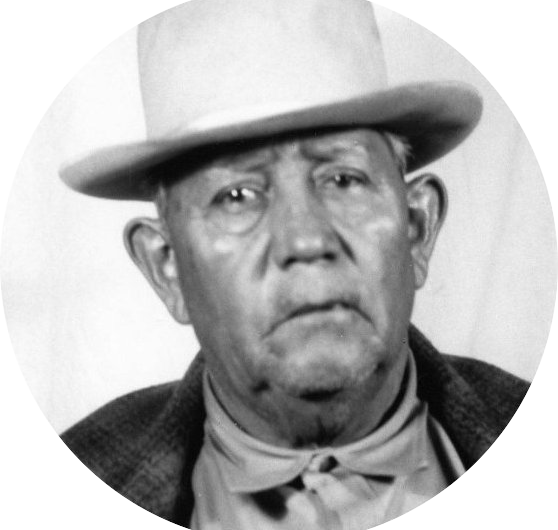 From this Corner
From this Corner
David Dushane Jr.
FROM THIS CORNER
By
Glenna J. Wallace
DAVID DUSHANE JR., SECOND CHIEF OF EASTERN SHAWNEE TRIBE OF OKLAHOMA
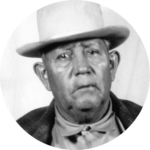
The tombstone located on the Missouri side of the Seneca Cemetery indicated death occurred in 1955.
Obituaries stated death occurred in May 1954. Such is the difficulty in researching tribal subjects who
lived more than 100 years ago. So many research errors can occur. Not researching and not writing
about those Eastern Shawnee historical subjects would be a greater error. A quiet man, Chief David
Dushane’s life and impact upon the Eastern Shawnee Tribe of Oklahoma should not go unnoticed.
Perhaps the most definitive information about David Dushane comes from an interview conducted with
him on October 26, 1937 with Nannie Lee Burns, an interview many of his descendants may not know
exists. In this interview David indicates he was born July 10, 1878 to his parents David Dushane and
mother Nancy Jackson Dushane. Dave, as he was later known as, states his father was a full blood
Shawnee Indian born in Johnson County, Kansas, near Olathe. Dave also states his mother was Nancy
Jackson Dushane who came with her parents when young from Sandusky, Ohio. Jack Dushane,
grandson of Dave’s brother Charles and one who has done considerable genealogical research, points
out that according to Nancy’s allotment paper Nancy was born in Ottawa County about 1845. Another
one of those points that could be debated. Interestingly enough according to Jack Dushane, Nancy
Jackson Dushane’s parents were John Jackson, a full blood Shawnee who died in 1877 and Ke-ne-fe-ase
Jackson who acquired an ill-fed Mexican infant in exchange for a sack of grain near a stone wall in
Oklahoma, thus accounting for the name of Stonewall Jackson. Ke-ne-fe-ase Jackson, half Shawnee,
died in 1897, at about 95 years of age.
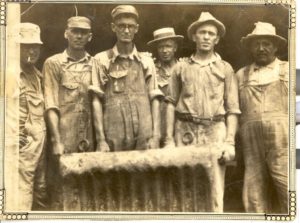
David in his younger years (far right).
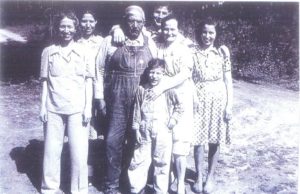
Vance Dushane Nelson, Genevieve Dushane Golden, David C. Dushane Jr., Jimmy Curtis Dushane, Allie (Wife), June Warren (Top) Jewel Dushane Crain “Aunt of Principal Chief Glenna Wallace.”
According to Dave’s interview, his parents married in Kansas and lived there six (6) years before coming
to Indian Territory in 1871. David Sr. and Nancy had four sons: Andrew, Charles, Daniel, and David.
Dave states his parents ”located on the state line just west of Seneca, Missouri”, a place that became
known as the Dushane farm, a place where Dave was born, raised his family, and lived until the time of
his death. Today, 2011, the place is still known as the Old Dushane place and makes up part of the site
where the new casino is being built.
In his 1937 interview Dave states, “My father’s family were among those who were moved for
protection to Kansas. Many things have not been understood by the Indians and under the treaty
between the Shawnees, in 1854, they agreed among themselves that those who chose to do so might
take their lands in severalty and those who did not like that plan might retain a part of the land we had
acquired from the Senecas, in common. Later, this led to a dispute and a division of the tribe as part of
them contended that those who had accepted their lands in severalty had severed their tribal relations.
This condition existed when the Civil War began.”
Dave goes on to state ”The Shawnees were driven out of here in the fall of 1862 when they went to
Kansas, taking with them only what was easy to carry, leaving most of their stock on the range and many
things in their houses, thinking, no doubt, that they would not be gone very long. Homesick, in the fall
of 1863, under the leadership of Black Bob, about a third of them returned to their home in the Indian
country where many of them, including their leader, Black Bob, sickened and died. In 1864, there were
more than eight hundred Shawnees in Kansas and there were more than a hundred of these Shawnees
in the Union Army. …In the spring of 1865 we started with an agent back to the Indian country in the
Indian Territory…traveled about eighty miles, stopped on Big Creek and here we remained through the
summer months …where we farmed some.” Dave concludes his history lesson by stating “Our band of
Shawnees completed their trip home in the fall of 1865; however my father did not come till later” or
1871 as he indicated earlier in the interview.
In 1884 at the age of six, Dave started at the Wyandotte Mission School at Wyandotte and attended
there nine years until he had to quit to work on the farm and to care for his father and mother. In 1892
lands were allotted with heads of families receiving 160 acres and each child 40. Dave would have been
about 14 years old at that time. According to his grandson Bud Nelson, Dave had to wait until he turned
21 until he could take over his allotment. Later the Too-Lates were given 40 acres each and according to
Dave “the balance of our land was sold to Judge Harvey of Wyandotte.”
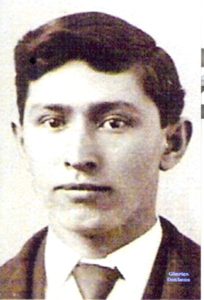
Charles Dushane, Sr.
On Christmas Day, December 25, 1907, at the age of 29 Dave married Allie Frazier, a woman whom he
described as “a white woman who was born in Kansas, January 10, 1888, but who had been raised in the
Indian Territory.” Dave and Allie had four daughters (Vance Nelson, Genevieve Golden, Jewell Crain,
and Madelyn Rosenow Dowd) and three sons (David M, June Warren and Jimmy Curtis). Jimmy died
while a teenager as the result of a fall from the bluffs while running traps. At the time of Dave’s death in
1954, Dave and Allie also had eighteen grand children and four great grand children.
Dave was proud to be an American Indian. He was proud of his ancestry, his heritage; so much so that
he named his youngest son Jimmy Curtis after Charles Curtis, the 31st Vice President of the United States
(1929- 1933) who was “the first person with significant acknowledged Native American ancestry and the
first person with significant acknowledged non-European ancestry to reach either of the two highest
offices in the United States Government’s executive branch. His maternal ancestry was three-quarters’
Native American, of ethnic Kaw, Osage and Pottawatomie ancestry. Curtis spent years of childhood
living with his maternal grandparents on their Kaw reservation.” Later grandson Buddy Charles Nelson
was named in honor of Charles Curtis as well.
Dave often referenced how living on the State Line affected life. He stated living “on the State Line
made it very easy for us to be attacked and robbed by bushwhackers who preyed on the settlers along
the Oklahoma border. We were too far from fort to get any protection…adding that when Shawnees
returned from Kansas some houses still standing “were occupied by a band of thieves and robbers who
by living on this side of the state line escaped from the law of the Border States. This condition caused
the agent, Major Snow, to request that a Company of United States Soldiers be stationed at Baxter
Springs, Kansas, for the protection of the Shawnees, the Senecas, the Peorias and the Quapaws.”
Ironically years later the Dushane place had another story involving thieves, robbers, and killers. Dee
Griffith, daughter of Vance Nelson and the first grandchild of Dave and Allie, told of how two of Dave
and Allie’s daughters had walked to Seneca, Missouri (about two miles), made some grocery purchases,
and were walking back home carrying the merchandise when a car stopped and offered them a ride
home. The girls accepted and rode home with the strangers, whereupon Allie offered iced tea and food
to them for being so kind and gracious to her daughters. The individuals declined and drove away. Only
after their departures were the girls able to tell Dave and Allie the car was full of guns. Later they
learned the identity of the strangers– Bonnie and Clyde after their infamous shootings in Joplin, MO.
Both Dee and Buddy Charles spoke of what a calm, quiet man their grandfather Dave Dushane was. He
believed in talking as opposed to spanking or whipping. Never a violent person, Dave always
demonstrated a calm, cool demeanor. That did not mean he could not be forceful, because he always
had the markings of a thoughtful decision maker. Dee recalls the time she was spending the night with
her grandparents and one of her uncles came home after having far too much to drink. Grandmother
Allie, typically the disciplinarian, could do nothing with her son. Dave went outside with the son and
returned alone. All was quiet and peaceful. Only the next morning did Dee look outside and realize how
Dave had handled the situation: there was the son chained and locked to a tree. (For years Dave was
employed as a jailer in Miami, Oklahoma.)
Dee also recalls one of the few times she heard her grandfather raise his voice. It was shortly after the
tragic death of the youngest child, Jimmy Curtis. Allie was extremely distraught and continued to be so.
Dave finally spoke in a stern loud voice telling her “That’s enough. We have lost a son but we have two
other ones. Life goes on.” From that point on Allie collected herself, dealt with the grief and moved
forward. Dee also speaks of the deep, rich love the two of her grandparents shared. She recalled seeing
them every Sunday afternoon leaving the house hand in hand to stroll down to the creek.
Dave Dushane played an important role in Eastern Shawnee history. When the first constitution and bylaws were ratified December 22, 1939, signing the document were Walter L. Bluejacket, Thomas A.
Captain, Ora S. Hampton, Edw. H Bluejacket and David Dushane, Jr. Walter L. Bluejacket was the first
elected Chief of the Tribe after the constitution was adopted in 1939, followed by David Dushane who
was the second Chief elected in 1940 followed by Thomas A. Captain who was the third Chief of the
Tribe. Bud Nelson recalls listening to many of the conversations held between his grandfather Dave
Dushane and Thomas A. Captain. Those conversations centered around how tribal citizens needed to
get along and thrive. Each recognized the need to blend in with the United States government and the
rest of the population without giving up our traditions. David Dushane, Jr. died May 3, 1954 at the age
of 76 from peritonitis caused by a ruptured appendix.
A plethora of words could be used to describe David Dushane, Jr. — integrity, honesty, fairness, calm,
rational, loving. Two words that he refused to acknowledge were “can’t” and “quit”. The Eastern
Shawnee Tribe of Oklahoma has progressed so much because of the leadership provided by our
founding fathers. May we all learn from them and heed the advice of David Dushane, Jr. who
admonished us to get along and thrive.
Information for this article came from 2011 personal interviews with Dee Griffith, Bud Nelson; 2011
correspondence with Jack Dushane; 1939 Constitution; 1937 interview between Nannie Lee Burns and
David Dushane, Jr.; newspaper clippings collected by Dee Griffith. Efforts have been made to be
factually accurate and additional information or corrections are always welcome.